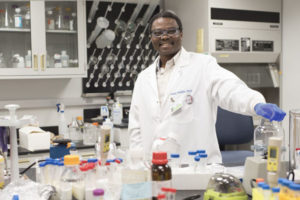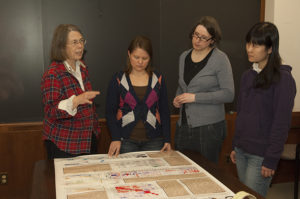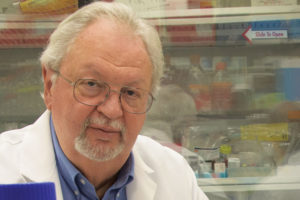Samuel I. Achilefu and Sarah C.R. Elgin will receive Washington University in St. Louis’ 2018 faculty achievement awards, Chancellor Mark S. Wrighton announced.
Achilefu, the Michel M. Ter-Pogossian Professor of Radiology at the School of Medicine, will receive the Carl and Gerty Cori Faculty Achievement Award.
Elgin, the Viktor Hamburger Professor of Arts & Sciences, will receive the Arthur Holly Compton Faculty Achievement Award.
Wrighton also announced that William A. Frazier III, a professor emeritus of biochemistry and molecular biophysics, of cell biology and physiology, and of biomedical engineering, will receive the Chancellor’s Award for Innovation and Entrepreneurship.
The three will receive their awards and give presentations of their scholarly work during a ceremony Oct. 5 at The Ritz-Carlton Hotel in Clayton.
“Professors Achilefu, Elgin and Frazier represent the very best of Washington University and join the distinguished company of previous winners who have worked creatively and diligently to discover and disseminate new knowledge that brings great benefit to society,” Wrighton said.
“These faculty achievement awards not only celebrate the excellence of individuals but also help create cooperative relationships across disciplinary lines and between the Danforth Campus and our School of Medicine Campus. These three professors embody the ideals of individual and collaborative excellence, and I am extremely pleased to recognize their achievements with these awards.”
Achilefu

Achilefu joined the faculty at Mallinckrodt Institute of Radiology at the School of Medicine in 2001. He serves as chief of the Optical Radiology Laboratory and director of the Washington University Molecular Imaging Center, and is also a professor of medicine, biochemistry and molecular biophysics, and of biomedical engineering. He has mentored and trained many trainees who have moved on to excel in diverse career paths.
Achilefu pioneered the development of molecular optical imaging and therapy of human diseases using novel devices, molecular probes and light-sensitive drugs.
He led a team that developed a wearable goggle-based imaging system for guiding surgical removal of tumors. And he co-discovered a treatment paradigm for cancer that incorporates a special type of light source and nanomaterials that can find and selectively trigger cancer cell death without harming healthy tissue. He also discovered a small molecule that can selectively identify most types of cancer.
Achilefu and Gregory Lanza, MD, PhD, the Oliver M. Langenberg Distinguished Professor of Science and Practice of Medicine, established the Center for Multiple Myeloma Nanotherapy with a $13.7 million grant from the National Cancer Institute (NCI). Work is underway at the center on three projects, including one led by Achilefu to develop a treatment that uses a combination of light and a photosensitizing drug to kill cancer cells while minimizing negative effects on healthy tissue. The center is one of six elite Centers of Cancer Nanotechnology Excellence supported by the NCI.
Achilefu also is the first recipient of the Breast Cancer Research Program Distinguished Investigator Award, from the U.S. Department of Defense. The award comes with $4.5 million to support his work to use light to activate drugs and the immune system in the body. He was inducted into the National Academy of Inventors in 2018 and received the 2014 St. Louis Award and the 2017 St. Louis American Excellence in Health Care Award.
The scientist and inventor holds 57 U.S. patents, including for novel methods, drugs and technologies to visualize and treat human diseases. He also is the co-leader of the Oncologic Imaging Program and a research member of Siteman Cancer Center at Barnes-Jewish Hospital and Washington University School of Medicine.
Achilefu earned his doctorate in molecular physical and materials chemistry at the University of Nancy, France, in 1991. He completed his postdoctoral training in 1993 at Oxford University, in England, where he trained in the chemistry of oxygen transport mechanisms and hematology. He joined the medical school faculty in 2001, after seven years in the Discovery Research Department at Mallinckrodt Medical Inc. in St. Louis.
Elgin

Elgin, who joined the faculty of Arts & Sciences in 1981, is a molecular biologist whose research focus is on the role of chromatin structure in gene regulation. She also is known for her passion for science outreach and expanding research opportunities for students.
Elgin is a professor of biology and of education, both in Arts & Sciences, and a professor of biochemistry and molecular biophysics and of genetics in the School of Medicine.
Chromatin is the complex of DNA and the proteins that package it up so that it will fit into the cell nucleus. Using the fruit fly (Drosophila melanogaster) as a model organism, Elgin and her research team study the chromosomal proteins that promote packaging into euchromatin or heterochromatin, alternative forms associated with gene expression and gene silencing, respectively — both critical to the health and development of multicellular organisms.
Her team at Washington University is noted for identifying and characterizing Heterochromatin Protein 1 (HP1) — a key protein found in organisms ranging from the ancient yeast S. pombe to humans — which plays a central role in silencing the transposable elements found in eukaryotic genomes.
Elgin leads a large and active research group and has taught undergraduate and graduate students and K-12 teachers courses in molecular genetics, genomics, bioinformatics and epigenetics, among other topics. She served as director of Washington University’s Howard Hughes Medical Institute (HHMI) Undergraduate Biological Science Education Program from 1992-2004.
Shortly after she started working at Washington University, Elgin began a Science Education Partnership with her children’s school district in University City. The outreach program that she started is now the Institute for School Partnership (ISP), directed by Victoria May, which reaches more than 2,500 teachers, 400 administrators and 100,000 students each year. The ISP is considered Washington University’s signature effort to strategically improve teaching and learning within the K-12 education community.
Elgin has also brought her teaching outreach passion to a national collegiate program she started called the Genomics Education Partnership (GEP). Sponsored by Washington University, HHMI and the National Science Foundation, GEP is a collaboration with a growing number of primarily undergraduate institutions (last numbering around 120 schools), the Washington University biology and computer science departments, and The McDonnell Genome Institute.
Elgin has previously been honored with the Missouri Governor’s Award for Excellence in Teaching and science education awards from the American Society for Biochemistry and Molecular Biology, American Society for Cell Biology, and the Genetics Society of America, among other honors. She is an elected fellow of the American Academy of Arts & Sciences.
Prior to joining Washington University, Elgin served on the faculty at Harvard University. Elgin graduated from Pomona College with a bachelor’s degree in chemistry in 1967 and earned her doctorate from California Institute of Technology in 1972. In 2017, she received an honorary doctorate from Pomona.
Frazier

An expert on the cardiovascular system, Frazier studies a protein implicated in cardiovascular disease, tumor biology and immunity. In 2006, he co-founded the biotech company Vasculox, recently rebranded as Arch Oncology, to develop humanized antibodies against this protein — known as CD47 — as a potential treatment for cancer and vascular diseases.
Immune cells help protect the body against cancer by identifying and consuming cancerous cells. But when they encounter CD47 on the surface of a cell, the immune cells interpret it as a “Don’t eat me!” signal. Frazier and colleagues are developing antibodies against CD47 to block this signal and help the immune system recognize and destroy tumor cells. Some of their antibodies also kill tumor cells directly, potentially making them even more effective.
In the cardiovascular system, CD47 opposes the activity of nitric oxide, a key player in the healthy functioning of the cardiovascular system. It expands blood vessels — increasing blood flow — decreases clotting and protects against injury caused by the loss and restoration of blood flow. By hampering nitric oxide activity, CD47 can make a bad situation worse. Anti-CD47 antibodies have the potential to improve oxygen delivery after organ transplantation, heart attacks, strokes and peripheral artery disease, possibly improving outcomes for patients.
In 2013, Frazier co-founded the biotech start-up YourBevCo, LLC, which develops consumer devices to remove ingredients known to cause allergic or sensitivity reactions from beverages. The company has developed single-use stirring wands that remove sulfites from wine and is studying the possibilities of developing a similar wand to remove gluten from beer.
Frazier completed his bachelor’s degree at Johns Hopkins University in 1969 before coming to the Washington University School of Medicine, where he earned his doctoral degree in biochemistry in 1973. He then moved to California for postdoctoral training at the UC San Diego School of Medicine. He joined the Washington University School of Medicine faculty in 1976 and remained until his retirement in January of this year.